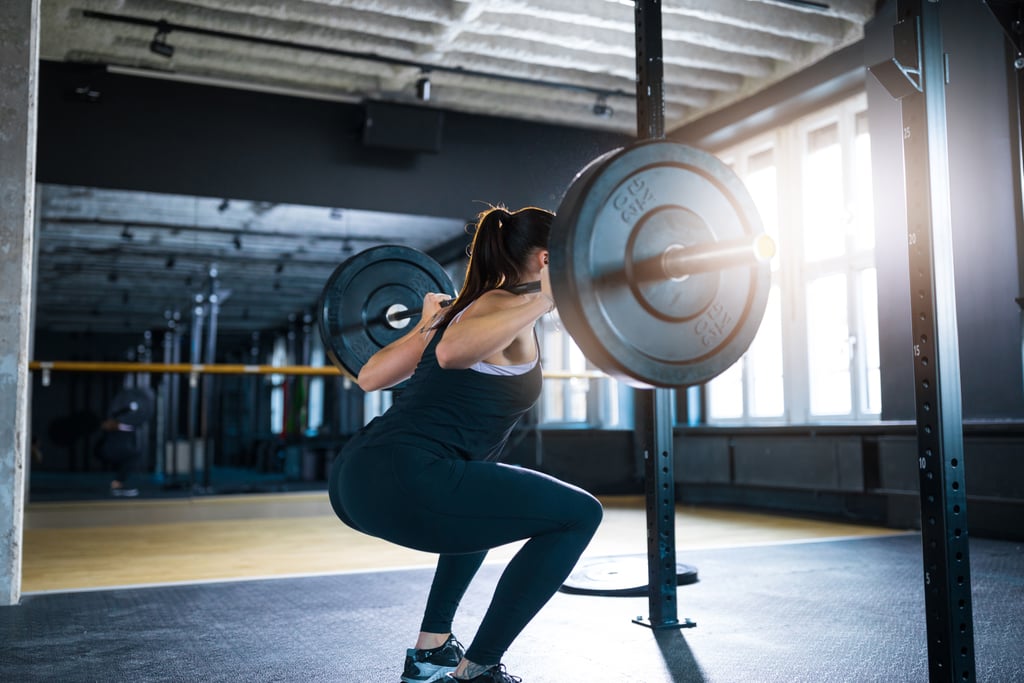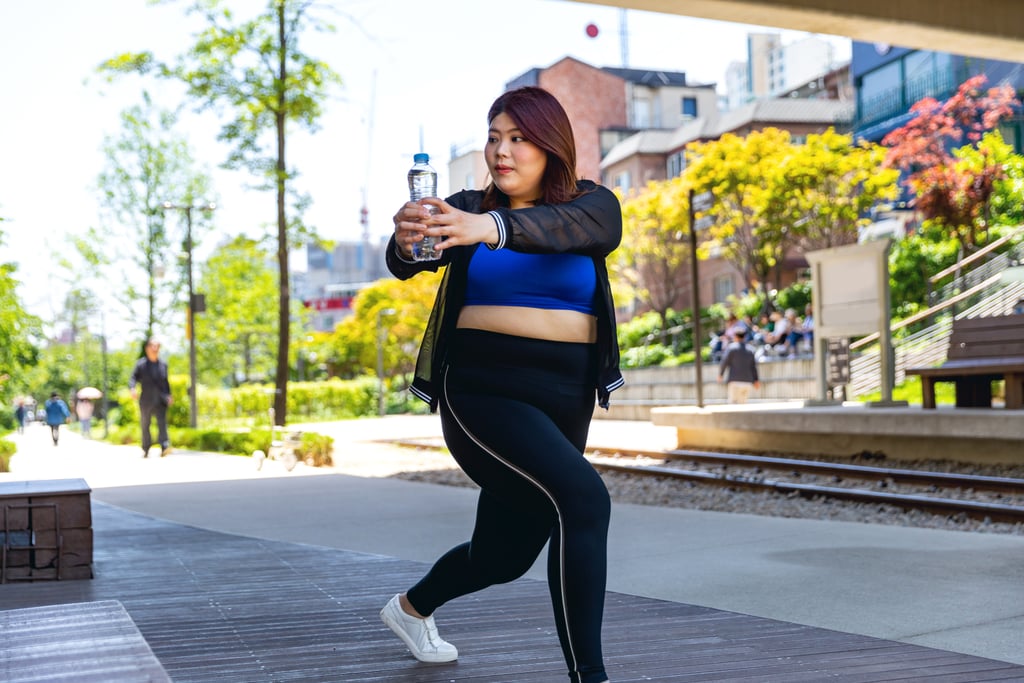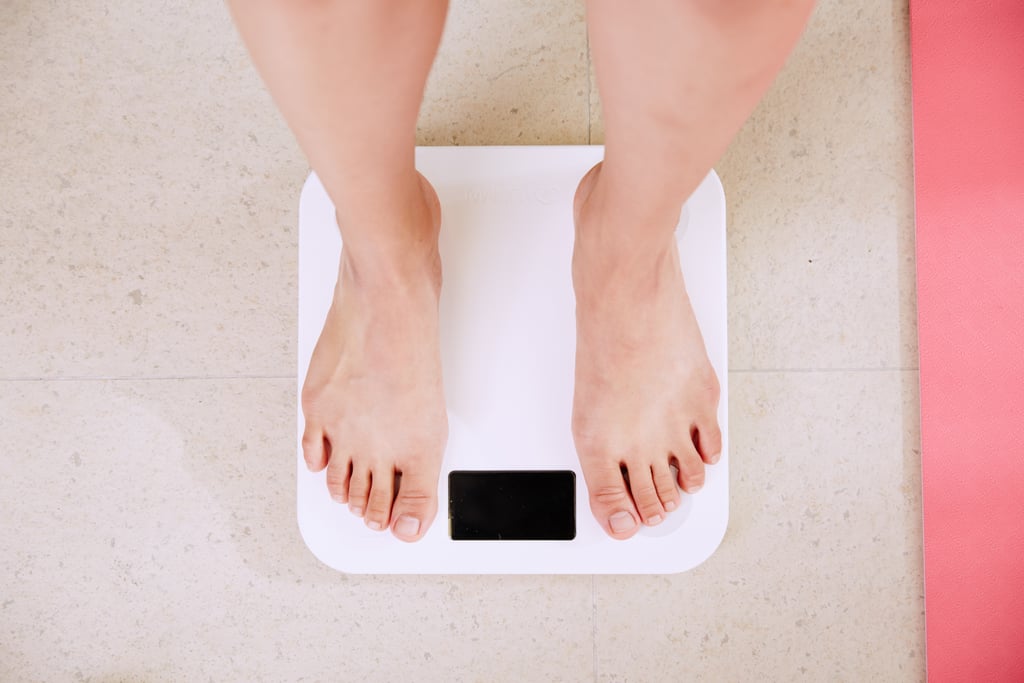There are a number of ways to tell the difference between fat versus muscle weight gain. First, we want to point out that everyone's bodies store fat differently. Based on genetics, some people store more visceral fat — fat that's around the organs within the abdominal cavity — and others store more subcutaneous fat, or the fat you can pinch with your fingers (you can read about that here [1]).
Another note: if you're actively trying to put on muscle [2], chances are you'll be able to tell if you're getting leaner or bulking up, which we'll touch on ahead. People also wonder, on the other hand, if building muscle will impede their weight-loss goals, which we'll discuss as well. We spoke to two experts on the differences between putting on muscle versus fat weight, why muscle can actually help with weight loss, and why you can't necessarily go by the number on the scale to track your progress.

How Muscle Forms vs. How Fat Forms (and How You Can Actually Gain Both at the Same Time)

Registered dietician, exercise physiologist, and NASM-certified personal trainer Gabbi Berkow [4], MA, CDN, told POPSUGAR that gaining fat on your body results from eating more calories than you burn. So, anything eaten in excess, whether that's protein, carbs, or fat, can be stored as fat if the calories you eat are greater than the calories you burn. Rondel King, MS, CSCS, exercise physiologist at the NYU Langone Sports Performance Center [5] in New York City, further explained: "Let's say, for instance, you're eating an excess of 1,000 calories than your resting metabolic rate is calling for. That needs to go somewhere. What the body does as a defence mechanism, it stores those excess calories as fat."
Gaining muscle is harder and requires a lot more work than gaining fat, Berkow noted. "You have to progressively overload [6] your muscles by lifting weights and continually challenging yourself over time," she said. "After every workout your muscles build more fibres so that they're better equipped to handle the stress of the next workout." But, you eventually get used to the load, which is why you have to keep increasing the intensity.
It's also about what you eat. King explained that protein is necessary [7] because it's essentially the building blocks to develop more muscle mass so you can become stronger and withstand the stresses that you've placed on your body. Since muscle is made of protein, Berkow said, you have to consume plenty of protein, around one gram per pound of bodyweight every day, for your body to be able to build muscle. (Eating more protein will also boost your metabolism [8].)
Since building more muscle fibres uses up a lot of calories, you'll build the most muscle if you eat more calories than you burn [9], Berkow said, so you can gain fat while building muscle. Building muscle without gaining fat, what she called a "clean bulk" where you put on muscle without eating more than your burn, is possible, but it requires "strict attention to calories and protein, and you won't put on as much muscle as you would if you ate more calories than you burned." Additionally, she said you can't significantly bulk up while you're focused on losing weight (aka, fat) due to the amount of calories required to build muscle. She discusses why muscle is important for weight loss, though, ahead.
Myth Buster: Muscle Doesn't "Weigh" More Than Fat

A kilogram of muscle weighs the same as a kilogram of fat: a kilogram is a kilogram! Muscle, though, is denser than fat, Berkow said. "It has more water, protein, carbohydrates, and fats in it than fat does, but it takes up less space. Since density equals weight divided by volume, the same amount or weight of muscle takes up less space than fat." That's why gaining muscle is often associated with losing inches but not necessarily total scale weight, she explained (which we'll get to more later).
How to Tell the Amount of Muscle and/or Fat You Have

Measuring your body composition — how much of you is made up of water, muscle, and fat — is the best way to assess whether you're gaining fat or muscle, Berkow said. King noted that many gyms do a body composition test of some sort before people start programs in order to get baseline values and therefore set realistic goals. Some tests include the following:
- Bioelectrical Impedance Analysis [10] (BIA): Body composition can be measured most easily with a BIA, "where harmless electrical currents through your body are used," Berkow explained. You even get a BIA scale that you step on or hold in your hands, but Berkow said to make sure you use it on an empty stomach and when you are hydrated "since being dehydrated can erroneously send up your body fat percentage reading."
- Skinfold calipers: These "pinch tests" can be used to measure gains or losses in body fat.
- DEXA scan: The dual-energy X-ray absorptiometry [11] (DEXA) scan is a radiological scan used to measure bone density. It's the most accurate way to measure your body composition, but is often less accessible than a BIA scale, Berkow said.
- CT scan and blood tests: These will indicate whether you've developed an increasing amount of visceral fat, and you or a doctor can proceed to take measurements of your waist circumference since most often, excess visceral fat can cause protrusion of the abdomen. You can read more about that here [12].
How to Tell Physically If You're Gaining Fat vs. Muscle

Aesthetically, it should be pretty easy to tell if you're generally gaining muscle or fat. When you gain muscle, you'll notice that your muscles naturally look more defined and are more visible, Berkow said. (To see your abs specifically, you'd have to also lose fat [13].) Your muscles would also be larger in size or feel "harder." If you gain fat, you'll notice more softness, she said, and you'll gain inches.
Building Muscle Helps With Fat Loss

"Building muscle is what keeps your metabolism up and helps prevent weight regain, so it's absolutely key for weight loss," Berkow told POPSUGAR, further explaining that muscle burns more calories than fat, so the more muscle you have, the more calories you'll burn at rest. Dieting and not focusing on muscle may make you regain the weight once you begin to eat more since your metabolic rate will have slowed.
Preserving your muscle mass is also important if your goal is to lose weight, because when you're in a caloric deficit [14] — which is essential for weight loss — "your body senses that it's getting less fuel, and it slows down the number of calories it burns," Berkow said. This slows down your metabolism in order to conserve energy, a phenomenon also known as starvation mode [15]. Strength training [16] and eating enough protein daily are key to keep your metabolism up so you can therefore lose weight, Berkow said. As she mentioned before, you can't build a huge amount of muscle while trying to lose weight since you need those extra calories, but you can still get toned.
Don't Base Your Weight-Loss Progress Solely on Scale Numbers

Even if you're losing fat, the numbers on the scale may not be going down if your muscle is increasing, Berkow said. "It's essential to measure your body composition, not just total weight, when you're losing weight. You want to make sure that muscle stays the same or goes up while fat goes down," she specified. Visually, you'll see a reduction in fat, King noted, and on the other hand you'll be developing muscle too, which is more dense, so you "won't necessarily see a huge change on the scale." So, instead of focusing on the scale alone, here are some progress indicators to pay attention to:
- More lean muscle
- Actual fat lost (inches)
- How you feel in your clothes
- Feeling stronger
- Improvements to your mental health
Looking For Workout and Nutrition Plans? Check These Out

Everyone has different goals, so make sure to speak with your doctor (and/or professionals such as registered dieticians and certified personal trainers) for a personalised plan. Berkow concluded, "Gaining muscle is hard and takes work. You have to lift heavy, eat a lot of protein, and find the balance of lifting enough while allowing for adequate recovery. Gaining fat is easy. Our bodies evolved to store excess calories as energy easily for times when food was scarce." Staying toned and losing fat is possible, but you can't bulk up and lose a significant amount of fat at the same time. "It's often best to focus on building muscle or losing fat," she said. Ahead, check out some places to start:
- 4-Week Workout Plan For Weight-Loss [17]
- Weekly Workout Plan to Build Muscle [18]
- Simple Meal Plan For Weight Loss [19]
- Low-Carb Meal Plan For Weight Loss [20]